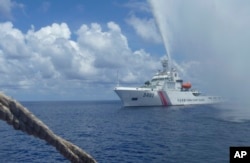After more than 15 years of intermittent talks, ASEAN member nations and China are expected to endorse the draft framework for a non-binding code of conduct that commits to cooperation rather than confrontations in the contested South China Sea, the Voice of America Khmer service has learned.
The draft framework is expected to be endorsed by ASEAN foreign ministers and China's foreign minister at the weeklong post-ministerial conference hosted by the Philippines, the current holder of ASEAN's revolving chairmanship. The meeting in Manila begins August 2.
A regional official who did not want to be named provided VOA Khmer with the draft framework of the code of conduct (COC), which would "establish rules-based framework containing a set of norms" to guide the conduct of parties and promote maritime cooperation in the South China Sea. The document is the outgrowth of talks called by China and held in May in Guiyang in Guizhou.
And while the draft framework is a move forward in a process that began in 2002, Tang Siew Mun, head of the ASEAN Studies Center at ISEAS-Yusof Ishak Institute in Singapore, said "this does not mean that the strategic trust gaps would narrow overnight."
Although the draft framework suggests that ASEAN and China can work together on a "sensitive issue," the draft framework is the first of many steps, Tang said, adding that the COC itself will take time to finalize, if it ever reaches that stage.
"The COC would only have meaning if it were legally binding, but it is unsure if the negotiating parties would be agreeable to a fair and just structure of managing relations in the South China Sea," Tang said.
The draft framework for the code of conduct calls for ASEAN members "to promote mutual trust, cooperation and confidence, prevent incidents, manage incidents should they occur, and create a favorable environment for the peaceful settlement of the disputes; to ensure maritime security and safety and freedom of navigation and overflight."
2002 document
The draft framework refers to the Declaration on the Conduct of Parties in the South China Sea (DOC) adopted in 2002, calling for "commitment to full and effective implementation of the DOC, respect for each other's independence, sovereignty and territorial integrity in accordance with international law, and the principle of non-interference in the internal affairs of other states." The COC, if finalized and signed, would supersede the DOC, which remains in force today.
ASEAN, the Association of Southeast Asian Nations, is a regional group that promotes economic, political and security cooperation among its 10 members: Brunei, Cambodia, Indonesia, Laos, Malaysia, Myanmar, the Philippines, Singapore, Thailand and Vietnam. ASEAN foreign ministers will join their counterparts from Japan, China and South Korea, a group which is known as ASEAN + 3. Foreign ministers from New Zealand, India and Australia will also attend next week's Manila sessions.
The ASEAN annual summit and the annual East Asia Summit are scheduled for November in the Philippines.
The widespread interest in the COC is due to the strategic and commercial importance of the energy-rich South China Sea. It is critical to the economies of ASEAN members Vietnam, Malaysia, Brunei, Indonesia and the Philippines. U.S. allies Japan and South Korea use the sea's shipping lanes, over which about $5 trillion in trade passes annually. China has reinforced its claims to the sea with the construction of artificial islands, which the United States and others have criticized.
Territorial disputes over the South China Sea extend beyond each nation's exclusive economic zone, which is internationally accepted to be no more than 200 nautical miles from shore. Fear of an accidental military action is real enough that in June 2016, ASEAN and China agreed to establish a hotline linking their foreign ministries.
The draft framework specifically states that it is "not an instrument to settle territorial disputes or maritime delimitation issues," which could lessen its effectiveness if agreed upon. Many ASEAN nations have advocated a multiparty solution to resolving the territorial disputes, but Beijing has said it will only engage in bilateral talks over these arguments.
Role of China
On Monday, while on an official visit to Bangkok, China's Foreign Minister Wang Yi said that China wants to "maintain stability in the South China Sea, abiding by the terms that have been agreed on the Declaration of Conduct and Code of Conduct in near future," Reuters reported.
Although China pushed for the draft framework, in the past it has failed to play by the rules established by ASEAN on fishing, building and energy exploration in the binding 2002 DOC.
Shihoko Goto, the senior northeast Asia associate at the Woodrow Wilson Center's Asia Program told VOA Khmer that the latest agreement to establish a draft framework has defused recent tensions in the region after discussions for a COC had been held on and off since 2000.
"The latest development means that not only have ASEAN member countries and China identified what the sources of conflict may be, but they are also committed to working together to find common ground to ensure that tensions do not escalate," Goto said. "That is progress, as worries about territorial claims continue."
She pointed out two problems facing the COC. China, the biggest player, "will dominate the rule-making process as well as the actual rules of the framework itself."
The other problem is that "U.S. reluctance to be engaged in the rule-making process in the South China Sea has become even clearer," Goto said. "That bodes ill for Washington's broader commitment to ensuring security in the region, and exemplifies Beijing's ever-growing influence in the region."







